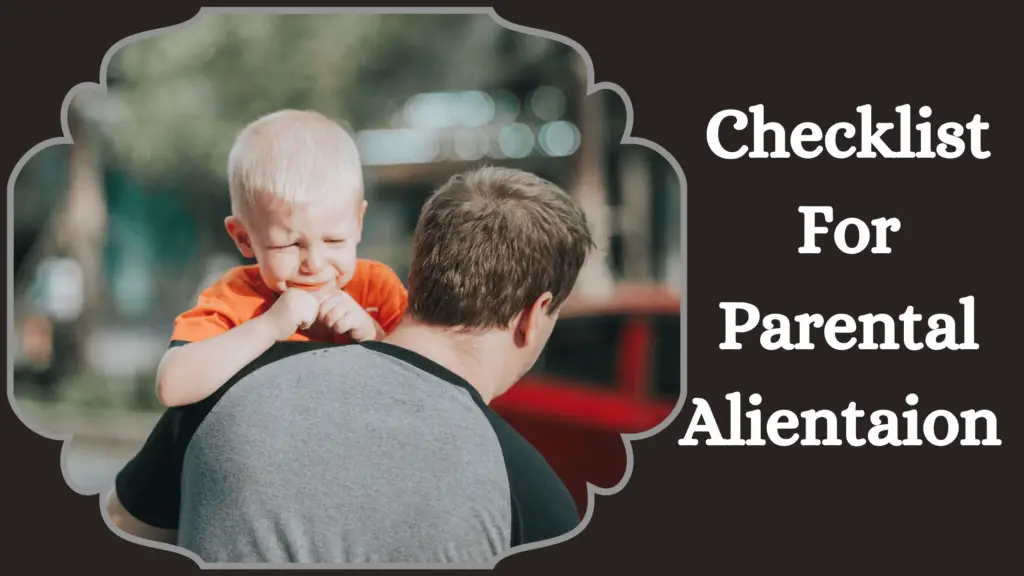If you’re grappling with the complexities of co-parenting or facing custody disputes, understanding parental alienation is essential for the well-being of your child and the maintenance of a healthy parent-child relationship. This understanding is made simpler by having a parental alienation checklist.
The Parental Alienation Phenomenon
Parental alienation has devastating effects on children and the family unit. At its core, parental alienation occurs when one parent employs manipulative behaviors to turn a child against the other parent, causing the child to develop unwarranted feelings of anger, fear, or even hatred. It’s important to differentiate this phenomenon from ordinary custody disputes or a child’s genuine feelings toward a parent. Parental alienation involves a calculated campaign to influence the child’s perception, causing them to distance themselves emotionally and psychologically from one parent.
While parental alienation might not involve overt abuse, its impact can be profound and far-reaching. Alienating parents typically engage in subtle yet insidious behaviors that undermine the child’s relationship with the targeted parent. These behaviors can range from making disparaging remarks about the other parent to questioning their decisions and authority. Left unchecked, these actions can escalate, leading to an unhealthy atmosphere where the child is coerced into aligning with one parent’s perspective, often at the expense of a loving and nurturing relationship with the other parent.
The Impact of Parental Alienation on Children
Emotional Scars
The emotional impact on children who endure parental alienation is profound. These young ones become entangled in a battleground, torn between their allegiance to one parent and their deeply rooted affection for the other. This internal struggle can give rise to intensified feelings of anxiety, heightened experiences of depression, and an overwhelming surge of confusion. The child’s sense of self-worth and self-identity intertwines with the alienating parent’s perspective, resulting in a skewed understanding of reality that undermines their genuine emotions and feelings.
Long-Term Consequences
Parental alienation can lead to a strained and fractured relationship between the child and the targeted parent. As the child grows older and begins to recognize the manipulation they were subjected to, feelings of anger and resentment may arise. This resentment could extend into adulthood, affecting their ability to form healthy relationships and trust others. The long-term consequences of parental alienation reverberate well beyond the immediate familial context.
Legal Safeguards
It is the responsibility of the legal system to protect the child’s best interests. Courts step in when required to guarantee that children have the chance to uphold positive and nurturing relationships with both parents. Through addressing parental alienation, the legal system strives to furnish children with the emotional and psychological support essential for their healthy development.
Read About: Judges View on Parental Alienation
Recognizing Signs of Parental Alienation
Red Flags in Children
Children affected by parental alienation often express their distress through behavioral changes. Here are some red flags to watch for:
- Unjustified Rejection: If your child suddenly and unreasonably refuses to spend time with or talk about the targeted parent, it could be indicative of alienation.
- Parroting Negative Statements: Pay attention if your child starts using derogatory language or repeating negative comments about the other parent, phrases they might not fully understand.
- Fear and Hostility: Be concerned if your child displays intense fear or hostility towards the targeted parent without any valid reasons.
Parental Alienation Behaviors
Alienating parents employ various tactics to achieve their goals:
- Undermining Authority: They consistently challenge the targeted parent’s decisions, making the child question their reliability and capability.
- Communication Interference: The alienating parent may limit or control communication between the child and the targeted parent, distorting the child’s perception.
- Derogatory Comments: Negative comments about the targeted parent erode the child’s respect and trust, making it harder for them to maintain a healthy relationship.
Sample Parental Alienation Checklist
Here is a parental alienation checklist that you can use to identify if a parent is engaging in alienating behaviors:
- Badmouthing the other parent. This includes making negative comments about the other parent’s appearance, personality, parenting skills, or character.
- Lying to the child about the other parent. This includes telling the child that the other parent doesn’t love them, is dangerous, or is not interested in spending time with them.
- Withholding information from the child about the other parent. This includes not giving the child the other parent’s contact information, not allowing the child to see pictures of the other parent, or not telling the child about the other parent’s activities.
- Pressuring or forcing the child to choose between parents. This includes asking the child to stop loving the other parent, to stop talking to the other parent, or to take sides in the parents’ conflict.
- Making the child feel guilty about spending time with the other parent. This includes telling the child that they are a bad child for spending time with the other parent, or that they are hurting the alienating parent by doing so.
- Threatening the child with harm if they spend time with the other parent. This includes telling the child that they will be taken away from the alienating parent, that the other parent will not love them anymore, or that something bad will happen to them if they spend time with the other parent.
- Excluding the other parent from important events in the child’s life. This includes not inviting the other parent to the child’s birthday party, school play, or graduation.
- Making the child feel like they are responsible for the parents’ conflict. This can be a way of manipulating the child into siding with the alienating parent.

The Role of Professionals in Identifying Parental Alienation
Navigating parental alienation often requires the expertise of mental health professionals. Collaborating with therapists or counselors can provide a comprehensive assessment of the situation. These experts can distinguish between genuine feelings and the effects of manipulation, helping to unravel the complexities at play.
Mental health professionals conduct thorough assessments that delve into the child’s psychological state, the dynamics of their relationship with both parents, and the broader context of the family dynamics. This holistic approach ensures that a situation isn’t mislabeled, which can have unintended consequences.
When dealing with potential parental alienation, it’s vital to document interactions and behaviors. These records can serve as crucial evidence, especially if legal action becomes necessary. Maintaining detailed notes, text messages, emails, and records of incidents can bolster your case and provide a clear picture of the alienating behaviors in action.
Legal Considerations and Interventions
The legal system recognizes the severity of parental alienation, particularly in the context of custody battles. Courts understand that alienation can cause long-term emotional harm to children and may take a stern stance against alienating parents. This recognition underscores the importance of addressing parental alienation promptly and effectively.
Courts can issue specific orders to address parental alienation. These interventions aim to break the cycle of manipulation and restore healthy parent-child relationships. Examples of interventions include requiring the alienating parent to attend parenting classes, undergo counseling, or adjust custody arrangements to minimize the impact of alienating behaviors.
While the primary focus is on addressing parental alienation, the court’s overarching concern is the child’s best interests. Striking a balance between allowing the child to maintain a relationship with both parents and addressing the alienation requires a delicate approach. The court aims to create an environment where the child can experience the love and support of both parents without the burden of manipulation.
Strategies for Addressing Parental Alienation
Having identified parental alienation with the help of a parental alienation checklist, you will need to be aware of how it can be addressed. Below are ways you can do this:
Rebuilding the Parent-Child Relationship
If you suspect parental alienation is occurring, consider the following strategies to rebuild the parent-child relationship:
- Reintroduce Positive Interactions: Find opportunities for you and your child to spend quality time together engaging in activities you both enjoy. This helps counteract the negative influence of alienation.
- Promote Open Communication: Create an environment where your child feels safe expressing their feelings and thoughts. Encourage open conversations that allow them to share their experiences without fear of judgment.
Parental Education and Counseling
Both parents can benefit from education and counseling:
- Co-Parenting Classes: Enroll in co-parenting classes that provide practical tools for effective co-parenting. These classes underscore the importance of putting the child’s well-being first and guide parents on fostering healthy relationships despite the challenges.
- Family Therapy: Engaging in family therapy sessions can help the entire family improve communication patterns and establish healthier dynamics. Family therapy sessions provide a structured environment for addressing issues and rebuilding trust.
Legal Actions
If alienating behaviors persist despite your efforts, legal actions may be necessary:
- Enforcing Court Orders: Ensure that court-ordered visitation schedules are strictly followed. Consistency in following these orders can help create a stable environment for your child.
- Supervised Visitation: In extreme cases, if the alienating behaviors continue, you may consider requesting supervised visitation. This ensures that your child’s emotional safety is prioritized during interactions.
Read About: Parental Alienation Deposition Questions
Long-Term Prevention and Support
Nurturing Healthy Bonds: The Key to Prevention
Preventing parental alienation requires ongoing effort and dedication:
- Shared Positive Experiences: Focus on creating positive memories with your child. Engaging in enjoyable activities together helps counteract the negative impact of alienation and reinforces the bond you share.
- Building Trust: Consistency is key to rebuilding trust. By consistently showing up, being present, and fulfilling your parental responsibilities, you reinforce your commitment to your child’s well-being.
Ongoing Monitoring: Preventing Relapses
Vigilance remains essential even after significant progress is made:
- Regular Check-ins: Maintain open communication with the child’s therapist or counselor. Regular check-ins allow you to monitor your child’s progress, address any emerging concerns, and make adjustments as needed.
- Periodic Reviews: Schedule periodic court reviews of the parenting plan. These reviews provide an opportunity to assess the child’s well-being and the effectiveness of the interventions implemented to address parental alienation.
Conclusion
Parental alienation is a big issue that needs everyone – parents, experts, and the law – to work together. If you notice the signs, get help from experts, use the above methods to fix and keep good relationships. Having a parental alienation checklist makes it easy. The bad effects of this sneaky problem can be stopped. The main goal is to give kids a safe place to grow up, where they feel loved and supported, and things get steady.







